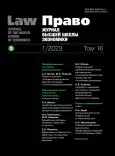Теория и практика толкования юридических документов судами с использованием словарей
- Авторы: Белов С.1, Ревазов М.1
-
Учреждения:
- Санкт-Петербургский государственный университет, 199034, Санкт-Петербург, Университетская наб., 7–9.
- Выпуск: Том 16, № 1 (2023)
- Страницы: 4-26
- Раздел: Правовая мысль: история и современность
- URL: https://journal-vniispk.ru/2072-8166/article/view/318226
- DOI: https://doi.org/10.17323/2072-8166.2023.1.4.26
- ID: 318226
Цитировать
Полный текст
Аннотация
Об авторах
Сергей Белов
Санкт-Петербургский государственный университет, 199034, Санкт-Петербург, Университетская наб., 7–9.
Email: s.a.belov@spbu.ru
ORCID iD: 0000-0003-4935-9658
Кандидат юридических наук, доцент
Михаил Ревазов
Санкт-Петербургский государственный университет, 199034, Санкт-Петербург, Университетская наб., 7–9.
Email: noreply@hse.ru
ORCID iD: 0000-0003-2642-5587
Преподаватель
Список литературы
- Aprill E. (1998) The law of the word: dictionary shopping in the Supreme Court. Arizona State Law Journal, vol. 30, no. 2, pp. 275-336.
- Batyushkina M.V. (2020) Legal concept and legal term: features of correlation and definitions (based on the material of Russian laws). Vestnik Kemerovskogo universiteta=Bulletin of Kemerovo University, vol. 22, no. 1, pp. 207-215 (in Russ.) DOI:https://doi.org/10.21603/2078-8975-2020-22-1-207-215
- Brudney J., Baum L. (2013) Oasis or mirage: The Supreme Court's thirst for dictionaries in the Rehnquist and Roberts eras. William and Mary Law Review, vol. 55, pp. 483-580. DOI:https://doi.org/10.2139/ssrn.2195644
- Coon N. (2019) 162 years of dictionary use in the Oregon appellate courts. Willamette Law Review, vol. 55, no. 2, pp. 213-260.
- Eskridge W. (1995) Cases and materials on legislation: statutes and the creation of public policy. St. Paul: West Publishing Co., 970 p.
- Golev N.D. (1999) The legal aspect of language in linguistic coverage. Urislingvist ika=Jurislinguistics, no. 1, pp. 12-59 (in Russ.)
- Green S. (2010) Understanding CERCLA through Webster's New World dictionary and state common law: forestalling the federalization of property law. New England Law Review, vol. 44, no. 4, pp. 835-868.
- Hutton C. (2011) Objectification and transgender jurisprudence: the dictionary as quasi-statute. Hong Kong Law Journal, vol. 41, no. 1, pp. 27-47.
- Katrechko N.A. (2009) The law as the key to justice (based on the material of the German language). Filologicheskie nauki=Philological Sciences, no. 2, pp. 136-140 (in Russ.)
- Khabibulina N.I. (2012) Grammatical interpretation of the norms of law. Rossiyskaya ustitcia=Russian justice, no. 7, pp. 56-62 (in Russ.)
- Kirchmeier J. (2010) Scaling the lexicon fortress: the United States Supreme Court's use of dictionaries in the twenty-first century. Marquette Law Review, vol. 94, no. 1, pp. 77-262.
- Mersky R. (2006) The Dictionary and the man: eighth edition of Black's law dictionary. Washington and Lee Law Review, vol. 63, no. 2, pp. 719-733.
- Mouritsen S. (2010) The dictionary is not a fortress: definitional fallacies and a corpus-based approach to plain meaning. Brigham Young University Law Review, no. 5, pp. 1915-1978.
- Mouritsen S. (2017) Corpus linguistics in legal interpretation. An evolving interpretative framework. Journal of Legal Linguistic, vol. 6, pp. 67-89.
- Nelson C. (2003) Originalism and interpretive conventions. University of Chicago Law Review, vol. 70, pp. 519-598. DOI:https://doi.org/10.2307/1600589
- Ozhegov S.I., Shvedova N. Yu. (1996) Explanatory dictionary of the Russian language. 3rd ed. Moscow: AZ press, 928 p. (in Russ.)
- Scalia A. (1995) Common-law courts in a civil-law system: the role of United States federal courts in interpreting the Constitution and laws. The Tanner Lectures on Human Values, 1995, pp. 77-121.
- Solan L., Gales T. (2016) Finding ordinary meaning in law: the judge, the dictionary or the corpus? International Journal of Legal Discourse, vol. 1, no. 2, pp. 253-276. DOI:https://doi.org/10.1515/ijld-2016-0016
- Tankersley D. (2018) Beyond the dictionary: why Sua Sponte judicial use of corpus linguistics is not appropriate for statutory interpretation. Mississippi Law Journal, vol. 87, no. 4, pp. 641-677. DOI:https://doi.org/10.2139/ssrn.3117223
- Thumma S., Kirchmeier J. (1999) The lexicon has become a fortress: The United States Supreme Court's use of dictionaries. Buffalo Law Review, vol. 47, pp. 227-302.
- Trubachev O.N. (1988) Methods of semantic reconstruction. Comparative historical study of languages of different families. Theory of linguistic reconstruction. Moscow: Nauka, pp. 197-222 (in Russ.)
- Vinogradov V.V. (1977) The main types of lexical meanings of the word. In: Selected works. Lexicology and lexicography. Moscow: Nauka, pp. 162-189 (in Russ.)
- Yates S. (2011) Black's law dictionary: the making of an American standard. Law Library Journal, vol. 103, no. 2, pp. 175-198.
Дополнительные файлы








